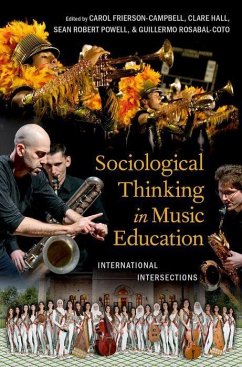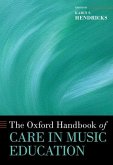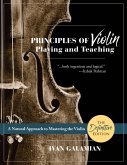Sociological Thinking in Music Education
International Intersections
Herausgeber: Frierson-Campbell, Carol; Rosabal-Coto, Guillermo; Powell, Sean Robert; Hall, Clare
Sociological Thinking in Music Education
International Intersections
Herausgeber: Frierson-Campbell, Carol; Rosabal-Coto, Guillermo; Powell, Sean Robert; Hall, Clare
- Gebundenes Buch
- Merkliste
- Auf die Merkliste
- Bewerten Bewerten
- Teilen
- Produkt teilen
- Produkterinnerung
- Produkterinnerung
Sociological Thinking in Music Education presents new ideas about music teaching and learning as important social, political, economic, ecological, and cultural ways of being, with an overarching aim to move beyond mere descriptions of what is by analyzing how social inequalities and inequities, conflict and control, and power can be understood in and through music teaching and learning at both individual and collective levels.
Andere Kunden interessierten sich auch für
![Thinking in and about Music Thinking in and about Music]() Zachary BernsteinThinking in and about Music137,99 €
Zachary BernsteinThinking in and about Music137,99 €![Hollywood Studio Musicians Hollywood Studio Musicians]() Robert R FaulknerHollywood Studio Musicians197,99 €
Robert R FaulknerHollywood Studio Musicians197,99 €![The Oxford Handbook of Care in Music Education The Oxford Handbook of Care in Music Education]() The Oxford Handbook of Care in Music Education189,99 €
The Oxford Handbook of Care in Music Education189,99 €![Thinking about Thinking Thinking about Thinking]() Carol BentonThinking about Thinking53,99 €
Carol BentonThinking about Thinking53,99 €![Teaching Music to Students with Differences and Disabilities Teaching Music to Students with Differences and Disabilities]() Alice M HammelTeaching Music to Students with Differences and Disabilities114,99 €
Alice M HammelTeaching Music to Students with Differences and Disabilities114,99 €![Principles of Violin Playing and Teaching (Dover Books on Music) Principles of Violin Playing and Teaching (Dover Books on Music)]() Ivan GalamianPrinciples of Violin Playing and Teaching (Dover Books on Music)16,99 €
Ivan GalamianPrinciples of Violin Playing and Teaching (Dover Books on Music)16,99 €![Conservatory Sight-singing Method [microform]: as Used in the Toronto Conservatory of Music Conservatory Sight-singing Method [microform]: as Used in the Toronto Conservatory of Music]() Conservatory Sight-singing Method [microform]: as Used in the Toronto Conservatory of Music29,99 €
Conservatory Sight-singing Method [microform]: as Used in the Toronto Conservatory of Music29,99 €-
-
-
Sociological Thinking in Music Education presents new ideas about music teaching and learning as important social, political, economic, ecological, and cultural ways of being, with an overarching aim to move beyond mere descriptions of what is by analyzing how social inequalities and inequities, conflict and control, and power can be understood in and through music teaching and learning at both individual and collective levels.
Hinweis: Dieser Artikel kann nur an eine deutsche Lieferadresse ausgeliefert werden.
Hinweis: Dieser Artikel kann nur an eine deutsche Lieferadresse ausgeliefert werden.
Produktdetails
- Produktdetails
- Verlag: Hurst & Co.
- Seitenzahl: 288
- Erscheinungstermin: 28. Januar 2022
- Englisch
- Abmessung: 251mm x 168mm x 28mm
- Gewicht: 567g
- ISBN-13: 9780197600962
- ISBN-10: 0197600964
- Artikelnr.: 62350476
- Herstellerkennzeichnung
- Libri GmbH
- Europaallee 1
- 36244 Bad Hersfeld
- gpsr@libri.de
- Verlag: Hurst & Co.
- Seitenzahl: 288
- Erscheinungstermin: 28. Januar 2022
- Englisch
- Abmessung: 251mm x 168mm x 28mm
- Gewicht: 567g
- ISBN-13: 9780197600962
- ISBN-10: 0197600964
- Artikelnr.: 62350476
- Herstellerkennzeichnung
- Libri GmbH
- Europaallee 1
- 36244 Bad Hersfeld
- gpsr@libri.de
Carol Frierson-Campbell coordinates the music education program at William Paterson University, where she teaches instrumental music pedagogy and research. Her scholarly interests include music education in marginalized communities, instrumental music education, and research pedagogy. Previous projects include the co-authored textbook Inquiry in Music Education: Concepts and Methods for the Beginning Researcher (with Hildegard Froehlich), the edited 2-volume Teaching Music in the Urban Classroom, and articles in Action, Criticism, and Theory for Music Education, Music Education Research and Arts Education Policy Review. During the 2015-2016 school year she served as Scholar in Residence at the Edward Said National Conservatory of Music in the occupied Palestinian Territories. Dr. F-C (as her students know her) also directs the WPU Music Fellows in partnership with the Paterson Music Project, providing music enrichment for children in Paterson, New Jersey. Clare Hall is Lecturer in Performing Arts, Monash University, Australia. Her research, educational and artistic practice coalesces around music, sound and performance to promote creative arts engagements across the lifespan. Her interdisciplinary scholarship bridges boundaries between the arts, education, and sociology, with her key contribution to date in music and masculinity. Her wider research agenda works to understand how the interplay of gender, class, ethnicity, race and generational differences influences arts teaching and learning as the means to produce more inclusive, diverse and sustainable cultural participation. She has served as Co-convenor of the International Symposium on the Sociology of Music Education 2016-2019 and her most recent book Masculinity, Class and Music Education was published in 2018. Sean Robert Powell is Associate Professor and Chair of Music Education at the University of North Texas where he teaches graduate courses in sociology, philosophy, qualitative research, and music teacher education. Dr. Powell is a member of the Editorial Review Boards of the Journal of Research in Music Education, Journal of Music Teacher Education, and Action, Criticism, and Theory for Music Education. He also serves as the Chair-Elect of the Society for Music Teacher Education. His work has been published widely in the top journal in the field, and he has presented research, workshops, and guest lectures at national and international venues. Dr. Powell has contributed chapters to the Oxford Handbook of Music Teacher Education in the United States and Narratives and Reflections in Music Education: Listening to Voices Seldom Heard. Guillermo Rosabal-Coto is a Professor of Music Education at Universidad de Costa Rica. He also holds teaching/research positions at the Graduate Music Program at Universidade do Estado de Santa Catarina (Brazil) and the Latin American Studies Program at the University of Toronto (Canada). He has guest edited special journal issues on music education and decolonization for ISME's Revista Internacional de Educación Musical (RIEM) and Action, Criticism and Theory in Music Education (ACT). He is currently Director of Editorial Universidad de Costa Rica.
* Foreword
* Hildegard C. Froehlich
* Acknowledgements
* Chapter 1: Introduction
* Carol Frierson-Campbell, Clare Hall, Sean Robert Powell, and
Guillermo Rosabal-Coto
* Chapter 2: Strong Voices for Sociology in Music Education in Mid and
Late Twentieth-Century America: A Milestone in the Making
* Marie McCarthy
* Intersection One: Sociological Thinking about Music Education in
Community Settings
* Chapter 3: Learning from Sociology? Revisiting the Notion of
Community in Music Education
* Alexandra Kertz-Welzel
* Chapter 4: Music, Everyday Life, and Music Education: Dimensions of a
Local Musical Field in Brazil
* Jusamara Souza
* Chapter 5: Singing the Revo: Memories of Music-in-Revolution and
Music-as-Revolution in Grenada, West Indies
* Danielle Sirek
* Chapter 6: Toward 'Little Victories' in Music Education: Troubling
Ableism through Signed-singing and d/Deaf Musicking
* Warren Churchill and Clare Hall
* Intersection Two: Sociological Thinking about Music Education in
School Settings
* Chapter 7: Placing the Music Teacher in an Era of Reform:
Synthesizing Research on Music Teacher Networks and Isolation
* Ryan Shaw
* Chapter 8: "A Perfect Mix?" Navigating Choice and Scarcity in a New
York City Music Program
* Frank Martignetti
* Chapter 9: Marching on an Uneven Field: A Bourdieusian Analysis of
Competitive High School Marching Band in the U.S.
* Jordan Stern
* Chapter 10: Facing Both Ways: Knowers, Knowledge and Bernstein's
Pedagogic Rights in Music Education
* Mandy Carver
* Chapter 11: A Sociological Travelogue of Music Education in Palestine
* Carol Frierson-Campbell
* Intersection Three: Sociological Thinking about Issues of
Colonization in Music Education
* Chapter 12: Towards a Decolonial Sociology for Music Learners
* Guillermo Rosabal-Coto
* Chapter 13: An Eco-Political View of the Venezuelan Cuatro
* Attilio Lafontant and Guillermo Rosabal-Coto
* Chapter 14: Making the Shift: Music Education Research as
(Antiracist) Racial Projects
* Samuel Escalante
* Chapter 15: Decolonizing and Indigenizing Music Education through
Self-Reflexive Sociological Research and Practice
* Anita Prest and J. Scott Goble
* Afterword
* Ruth Wright
* Bibliography
* Index
* Hildegard C. Froehlich
* Acknowledgements
* Chapter 1: Introduction
* Carol Frierson-Campbell, Clare Hall, Sean Robert Powell, and
Guillermo Rosabal-Coto
* Chapter 2: Strong Voices for Sociology in Music Education in Mid and
Late Twentieth-Century America: A Milestone in the Making
* Marie McCarthy
* Intersection One: Sociological Thinking about Music Education in
Community Settings
* Chapter 3: Learning from Sociology? Revisiting the Notion of
Community in Music Education
* Alexandra Kertz-Welzel
* Chapter 4: Music, Everyday Life, and Music Education: Dimensions of a
Local Musical Field in Brazil
* Jusamara Souza
* Chapter 5: Singing the Revo: Memories of Music-in-Revolution and
Music-as-Revolution in Grenada, West Indies
* Danielle Sirek
* Chapter 6: Toward 'Little Victories' in Music Education: Troubling
Ableism through Signed-singing and d/Deaf Musicking
* Warren Churchill and Clare Hall
* Intersection Two: Sociological Thinking about Music Education in
School Settings
* Chapter 7: Placing the Music Teacher in an Era of Reform:
Synthesizing Research on Music Teacher Networks and Isolation
* Ryan Shaw
* Chapter 8: "A Perfect Mix?" Navigating Choice and Scarcity in a New
York City Music Program
* Frank Martignetti
* Chapter 9: Marching on an Uneven Field: A Bourdieusian Analysis of
Competitive High School Marching Band in the U.S.
* Jordan Stern
* Chapter 10: Facing Both Ways: Knowers, Knowledge and Bernstein's
Pedagogic Rights in Music Education
* Mandy Carver
* Chapter 11: A Sociological Travelogue of Music Education in Palestine
* Carol Frierson-Campbell
* Intersection Three: Sociological Thinking about Issues of
Colonization in Music Education
* Chapter 12: Towards a Decolonial Sociology for Music Learners
* Guillermo Rosabal-Coto
* Chapter 13: An Eco-Political View of the Venezuelan Cuatro
* Attilio Lafontant and Guillermo Rosabal-Coto
* Chapter 14: Making the Shift: Music Education Research as
(Antiracist) Racial Projects
* Samuel Escalante
* Chapter 15: Decolonizing and Indigenizing Music Education through
Self-Reflexive Sociological Research and Practice
* Anita Prest and J. Scott Goble
* Afterword
* Ruth Wright
* Bibliography
* Index
* Foreword
* Hildegard C. Froehlich
* Acknowledgements
* Chapter 1: Introduction
* Carol Frierson-Campbell, Clare Hall, Sean Robert Powell, and
Guillermo Rosabal-Coto
* Chapter 2: Strong Voices for Sociology in Music Education in Mid and
Late Twentieth-Century America: A Milestone in the Making
* Marie McCarthy
* Intersection One: Sociological Thinking about Music Education in
Community Settings
* Chapter 3: Learning from Sociology? Revisiting the Notion of
Community in Music Education
* Alexandra Kertz-Welzel
* Chapter 4: Music, Everyday Life, and Music Education: Dimensions of a
Local Musical Field in Brazil
* Jusamara Souza
* Chapter 5: Singing the Revo: Memories of Music-in-Revolution and
Music-as-Revolution in Grenada, West Indies
* Danielle Sirek
* Chapter 6: Toward 'Little Victories' in Music Education: Troubling
Ableism through Signed-singing and d/Deaf Musicking
* Warren Churchill and Clare Hall
* Intersection Two: Sociological Thinking about Music Education in
School Settings
* Chapter 7: Placing the Music Teacher in an Era of Reform:
Synthesizing Research on Music Teacher Networks and Isolation
* Ryan Shaw
* Chapter 8: "A Perfect Mix?" Navigating Choice and Scarcity in a New
York City Music Program
* Frank Martignetti
* Chapter 9: Marching on an Uneven Field: A Bourdieusian Analysis of
Competitive High School Marching Band in the U.S.
* Jordan Stern
* Chapter 10: Facing Both Ways: Knowers, Knowledge and Bernstein's
Pedagogic Rights in Music Education
* Mandy Carver
* Chapter 11: A Sociological Travelogue of Music Education in Palestine
* Carol Frierson-Campbell
* Intersection Three: Sociological Thinking about Issues of
Colonization in Music Education
* Chapter 12: Towards a Decolonial Sociology for Music Learners
* Guillermo Rosabal-Coto
* Chapter 13: An Eco-Political View of the Venezuelan Cuatro
* Attilio Lafontant and Guillermo Rosabal-Coto
* Chapter 14: Making the Shift: Music Education Research as
(Antiracist) Racial Projects
* Samuel Escalante
* Chapter 15: Decolonizing and Indigenizing Music Education through
Self-Reflexive Sociological Research and Practice
* Anita Prest and J. Scott Goble
* Afterword
* Ruth Wright
* Bibliography
* Index
* Hildegard C. Froehlich
* Acknowledgements
* Chapter 1: Introduction
* Carol Frierson-Campbell, Clare Hall, Sean Robert Powell, and
Guillermo Rosabal-Coto
* Chapter 2: Strong Voices for Sociology in Music Education in Mid and
Late Twentieth-Century America: A Milestone in the Making
* Marie McCarthy
* Intersection One: Sociological Thinking about Music Education in
Community Settings
* Chapter 3: Learning from Sociology? Revisiting the Notion of
Community in Music Education
* Alexandra Kertz-Welzel
* Chapter 4: Music, Everyday Life, and Music Education: Dimensions of a
Local Musical Field in Brazil
* Jusamara Souza
* Chapter 5: Singing the Revo: Memories of Music-in-Revolution and
Music-as-Revolution in Grenada, West Indies
* Danielle Sirek
* Chapter 6: Toward 'Little Victories' in Music Education: Troubling
Ableism through Signed-singing and d/Deaf Musicking
* Warren Churchill and Clare Hall
* Intersection Two: Sociological Thinking about Music Education in
School Settings
* Chapter 7: Placing the Music Teacher in an Era of Reform:
Synthesizing Research on Music Teacher Networks and Isolation
* Ryan Shaw
* Chapter 8: "A Perfect Mix?" Navigating Choice and Scarcity in a New
York City Music Program
* Frank Martignetti
* Chapter 9: Marching on an Uneven Field: A Bourdieusian Analysis of
Competitive High School Marching Band in the U.S.
* Jordan Stern
* Chapter 10: Facing Both Ways: Knowers, Knowledge and Bernstein's
Pedagogic Rights in Music Education
* Mandy Carver
* Chapter 11: A Sociological Travelogue of Music Education in Palestine
* Carol Frierson-Campbell
* Intersection Three: Sociological Thinking about Issues of
Colonization in Music Education
* Chapter 12: Towards a Decolonial Sociology for Music Learners
* Guillermo Rosabal-Coto
* Chapter 13: An Eco-Political View of the Venezuelan Cuatro
* Attilio Lafontant and Guillermo Rosabal-Coto
* Chapter 14: Making the Shift: Music Education Research as
(Antiracist) Racial Projects
* Samuel Escalante
* Chapter 15: Decolonizing and Indigenizing Music Education through
Self-Reflexive Sociological Research and Practice
* Anita Prest and J. Scott Goble
* Afterword
* Ruth Wright
* Bibliography
* Index








![Conservatory Sight-singing Method [microform]: as Used in the Toronto Conservatory of Music Conservatory Sight-singing Method [microform]: as Used in the Toronto Conservatory of Music](https://bilder.buecher.de/produkte/68/68747/68747780m.jpg)